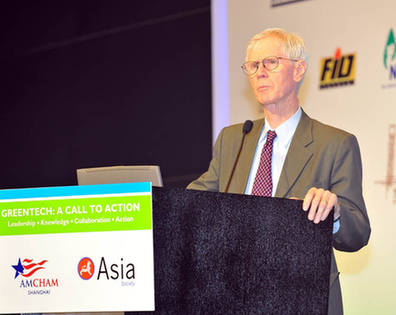Building a New Model of Major-Country Relationship – An Interview with Orville Schell
By ARYA
China expert Orville Schell is the Arthur Ross Director of the Center on U.S.-China Relations at the Asia Society in New York. Schell began learning Chinese when he was 20, and in 1968 obtained his Ph.D. in Chinese History from the University of California, Berkeley. He has since specialized in news reports and books on East Asia, China in particular. When Deng Xiaoping, chief architect of China’s reform and opening-up drive, visited the U.S. in 1979, the New York Times invited Schell to be the journalist accompanying Deng on his U.S. tour.
There has been a succession recently of sensational events in bilateral economic exchanges, such as the Shanghai Husi Food scandal, when popular brands such as McDonalds, KFC, and Starbucks were supplied with expired meat, and China ecommerce giant Alibaba’s launch on the New York Stock Exchange of its IPO. Under this new situation, how does Schell regard U.S.-China relations?
The reporter’s exclusive interview with Orville Schell gives answers to this question.
 |
|
Orville Schell |
New Major-country Relationship Still in the Works
Reporter: What’s your view on the new model of major-country relationship that China and the U.S. are working to establish between them?
Orville Schell: I think this relationship is still in the process of formation. And recent, growing frictions between the two countries have had an adverse effect on the progress of bilateral ties.
Reporter: Can you give an example?
Orville Schell: American entrepreneurs’ mindset about China has changed dramatically. I recently attended a business forum in Washington D.C., where many entrepreneurs, rather than focusing on technical issues, were preoccupied with whether or not they had a future in China. The doubts this discussion raised had been hitherto unheard of.
The initiatives of American entrepreneurs seeking development in China are dwindling. They believe China’s government is raising the bar for their market entry through new regulations, in such areas as anti-monopoly and food safety, which constitute more pressure. The number of American entrepreneurs investing in China consequently falls each month.
Reporter: Chinese companies, however, are also complaining about American trade protectionism. What’s your view on that?
Orville Schell: The U.S. government would decline investment from Chinese companies solely for one reason – that of national security. Real estate companies generally encounter relatively small barriers to the U.S. market, but those confronting tech firms like Huawei are indeed big.
Many ignorant Republicans in the United States Congress have created trouble for China-U.S. economic exchanges. But they do not actually represent the U.S. government. A number of Chinese people have gained the impression that the U.S. government bars all Chinese enterprises, but this is not an objective view.
- Difficulties, Solutions, and Hope
- Building a New Model of Major-Country Relationship – An Interview with Orville Schell
- A New Dimension to China’s Interactions with the World
- A Rare Opportunity to Understand Contemporary China – Xi Jinping: The Governance of China
- Xi Jinping: The Governance of China – Published in Multilanguages
